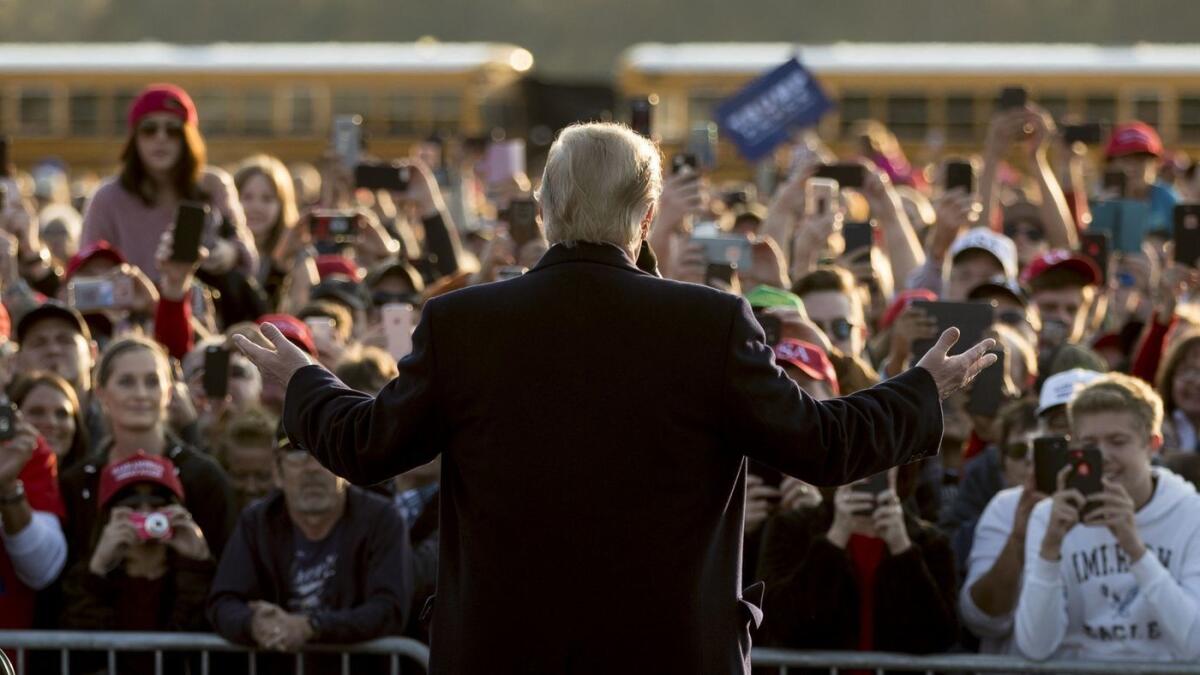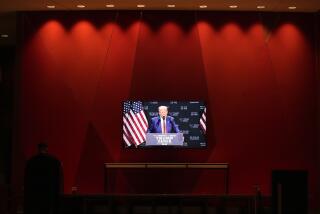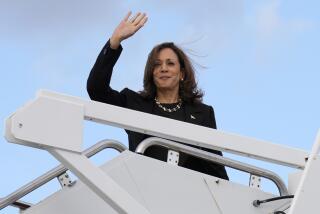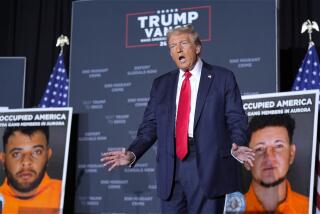White House scrambles to portray Trump as empathetic amid backlash to president’s response to violence

Reporting from Washington — Amid intense criticism and signs of sagging poll numbers, White House officials hurried to cast President Trump as empathetic Monday, scheduling an immediate visit to the site of the deadly synagogue attack in Pittsburgh and holding a press briefing — an increasingly rare event — designed to rebuff widespread disapproval of the president’s response.
Even as aides worked to portray Trump as a unifying figure, however, the president continued to lash out at critics, including the news media he labeled as “the true Enemy of the People.” In a tweet Monday morning, he stirred fear of an immigrant “invasion,” choosing the same word used by the suspect in the Pittsburgh shooting spree that killed 11 Jewish worshipers Saturday.
Trump also ordered a stepped-up military presence on the southern border, ostensibly aimed at countering a migrant caravan that remains about 900 miles south of the U.S. and has diminished in size, according to Mexican officials and reporters on the scene.
Trump has repeatedly faced a conflict between the president’s traditional role as a national unifier and his political strategy, which focuses intensely on using battles over identity and culture to stoke the fervor of his core supporters.
The clash has seldom appeared more stark than in the last several days — punctuated by mail bombs targeting the president’s critics and the Pittsburgh shooting — amid an intense midterm election campaign that Trump sees as a referendum on his presidency.
White House aides bristle at any suggestion that Trump’s polarizing rhetoric has contributed to stirring up violence, saying he can’t be held responsible for the deeds of extremists, even if they echo his own language or consider themselves followers of his, as in the case of the man arrested last week on suspicion of mailing pipe bombs to prominent Democrats and other Trump critics.
But that argument seems not to have fully convinced the public. A Gallup poll released Monday showed Trump’s approval had dropped four percentage points in the last week, to 40%. A USC-Dornsife/Los Angeles Times poll, also released Monday, showed a significant upward spike in support for Democrats late last week. And a senior Republican pollster confirmed that internal GOP surveys have similarly shown “some erosion” in the party’s position.
A separate poll released on Monday but conducted before the recent violence suggested a potential reason such moments hurt Trump’s standing: 54% of Americans believe that Trump’s decisions and behavior have encouraged white supremacist groups, according to the survey by the nonpartisan Public Religion Research Institute. The same survey found 69% of Americans said that Trump has damaged the dignity of the presidency.
Previous presidents have won wide approval from Americans following tragedies, even at moments when their own public standing was low: President George W. Bush famously grabbed a bullhorn during his visit to Ground Zero following the Sept. 11 attacks and told first responders that the nation stood by their side. President Reagan drew on poetry to mourn with the nation after the space Shuttle Challenger blew up. President Clinton used the power of his empathy to sit with survivors of the Oklahoma City bombing. President Obama sang “Amazing Grace” in a Charleston, S.C., church after nine African Americans were killed.
Trump, by contrast, has offered scripted consolations over the past week, and, at times, adopted the pose of someone passively consuming the news, not shaping it.
“It looks like the results are coming in, and they’re far more devastating than anybody originally thought in the morning,” he said to reporters Saturday about the Pittsburgh shooting. “In the morning, they thought that it was a shooter, but they had the shooter, or they soon would. But the results are very devastating. You’re seeing the numbers come in.”
David Gergen, an advisor to presidents of both parties dating back to the Nixon administration, found the posture highly unusual for a commander in chief.
“It’s like he’s a bystander. He’s watching the game on the field,” he said.
“Donald Trump is the first in living memory who seems to believe that leadership is about bringing … passions to a boil,” Gergen added. “That has won him some support with portions of our politic, but my own sense is that most Americans much prefer unity over disunity, civility over incivility and that these will ultimately come back to haunt the president.”
Tim Naftali, professor of public service and presidential history at New York University said the country has been “lucky — and it wasn’t inevitable — that we’ve had so many presidents who’ve understood the country’s need for a uniter in a time of sadness and tragedy.”
“It’s understandable that Americans would hope that the 45th POTUS would show the same kind of compassion and empathy when the nation is in mourning,” he said.
Trump has not had many such moments, and his reactions have been heavily criticized. After the deadly 2017 clash between white supremacists and anti-fascist counter-protesters in Charlottesville, Va., Trump said there were “some very fine people on both sides” of the protests. While visiting hurricane-ravaged Puerto Rico, he casually tossed paper towel rolls into a crowd.
Trump’s message over the last few days: Blame the media.
“There is great anger in our Country caused in part by inaccurate, and even fraudulent, reporting of the news. The Fake News Media, the true Enemy of the People, must stop the open & obvious hostility & report the news accurately & fairly. That will do much to put out the flame,” Trump tweeted.
Press Secretary Sarah Huckabee Sanders, at her briefing, only the second this month, held back tears as she condemned the “chilling act of mass murder” in Pittsburgh and announced that Trump would visit the city on Tuesday.
The city’s mayor told reporters hours later that the families needed space to bury their dead before a presidential visit.
Sanders grew defensive as reporters homed in on the criticism that Trump had continued to attack political opponents even as he has talked about a need to unify.
“The very first thing that the president did was condemn the attacks, both in Pittsburgh and in the pipe bombs,” Sanders said. “The very first thing the media did was blame the president and make him responsible for these ridiculous acts. That is outrageous.”
Sanders said Trump would continue to draw “policy differences” with Democrats leading into the elections next week, sidestepping a question about Trump’s labeling of the African American Democrat running for governor of Florida as “a thief.”
Hours later, the White House held a background call with reporters to emphasize Trump’s “unprecedented” commitment to campaigning ahead of next week’s midterm elections, including a frenetic schedule of 11 rallies in eight states for the final six days that will begin the day after Trump visits Pittsburgh.
Earlier in the day, the president tweeted about the caravan of Central American migrants he has succeeded in making a campaign issue.
“Many Gang Members and some very bad people are mixed into the Caravan heading to our Southern Border. Please go back, you will not be admitted into the United States unless you go through the legal process. This is an invasion of our Country and our Military is waiting for you!”
Trump has continued his efforts to portray the caravan as a violent mob about to storm across the border. Robert Bowers, the alleged synagogue shooter, referred to the caravan in his social media posts, which expressed rage toward HIAS, an organization founded by Jews that helps settle immigrants and refugees in the U.S.
“When the president made this long statement, he condemned violence and antisemitism, but he did not mention once that this murderer attacked Jews because Jews were helping refugees,” said Mark Hetfield, the president of HIAS. “Nor did he reflect at all about his own role in increasing anti-refugee sentiment in this country,” Hetfield added. “That’s what deeply troubles me.
“Hate speech always leads to hateful acts, and we’re at that stage now,” he said.
UPDATES:
4 p.m.: This article was updated with the announcement of Trump’s planned travel to Pittsburgh, statements from the White House briefing and additional details and context.
This article was originally published at 11:10 a.m.
More to Read
Get the L.A. Times Politics newsletter
Deeply reported insights into legislation, politics and policy from Sacramento, Washington and beyond. In your inbox three times per week.
You may occasionally receive promotional content from the Los Angeles Times.












